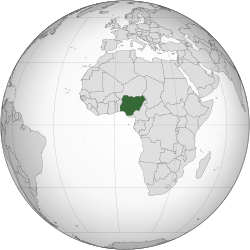Regionalism
The original regional Premiers of the republic were the following:
The country was split into three geopolitical regions—Western Region, Eastern Region and Northern Region—and its political parties took on the identities and ideologies of each region. The Northern People's Congress (NPC) represented the interests of the predominantly Hausa/Fulani Northern Region, the National Council of Nigeria and the Cameroons (NCNC) (later renamed to "National Council of Nigerian Citizens") represented the predominantly Igbo Eastern Region, and the Action Group (AG) dominated the Yoruba Western Region. The NPC took control of the federal parliament, and formed a coalition government with the NCNC. The National Independence Party (NIP) formed by Professor Eyo Ita became the second political party in the old Eastern Region. Ahmadu Bello, the Sardauna of Sokoto, leader of the NPC, was poised to become the prime minister, but instead he chose to become the premier of the Northern Region, and supported his deputy Tafawa Balewa's candidacy for the prime ministership. This raised suspicions among the southern politicians, who resented the idea of a federal government controlled by a regional leader through his designated proxy. In the end, Tafawa Balewa of NPC was named Prime Minister and Head of Government, and Nnamdi Azikiwe of NCNC was named President.
At Nigeria's independence, the Northern Region gained more seats in parliament than both Eastern and Western regions combined—this would cement Northern dominance in Nigerian politics for years to come. Resentment among southern politicians precipitated into political chaos in the country. Obafemi Awolowo, Premier of Western Region, was accused of attempting to overthrow the government. This followed a period of conflict between the AG regional government and the central government. In spite of the flimsiness of the evidence presented by the government's prosecutors, he was convicted. With incarceration of Awolowo, Samuel Akintola took over as the premier of Western Region. Because Akintola was an ally of Ahmadu Bello, the undisputed strong man of Nigeria, Akintola was criticized as being a tool of the North. [8] As premier of the West, Akintola presided over the most chaotic era in Western Region—one which earned it the nickname "the Wild-Wild West". However, as late as Thursday, 13 January 1966, Balewa had announced that the federal government was not going to intervene in the West. [9] However, the very next day, Akintola, premier of the West met with his ally Ahmadu Bello, the Sardauna of Sokoto, premier of the North and party boss of NPC party to which Balewa belonged. [10] At the same time a top-level security conference in Lagos was taking place which was attended by most of the country's senior army officiers. All of this activity created rumors that the Balewa government would be forced to crack down on lawlessness in the West using military might. [10]



